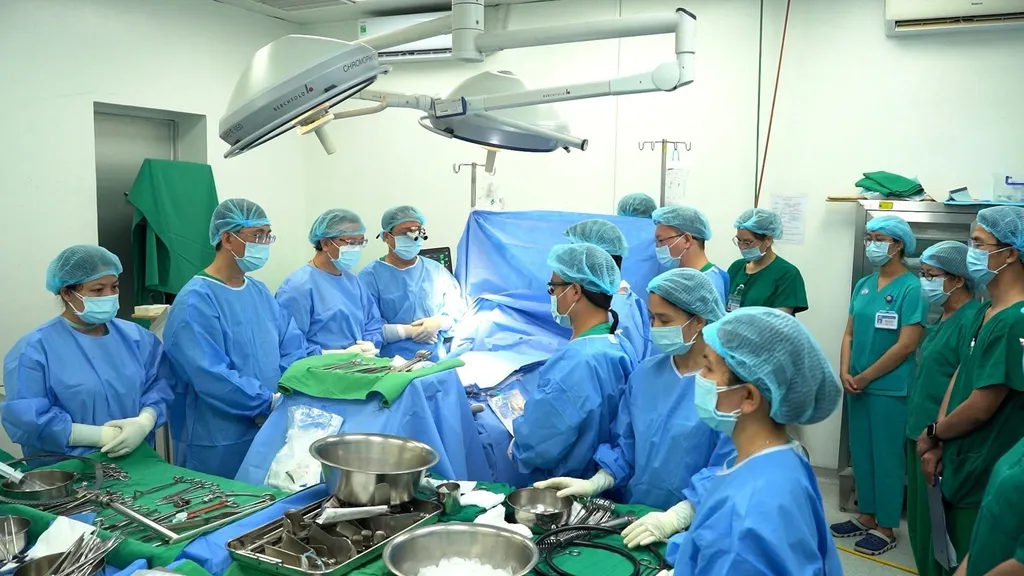 Society
Society

 |
| The medical staff holds a moment of silence to honour and pay tribute to the organ donor before the organ retrieval. — VNA/VNS Photo Đinh Hằng |
HCM CITY — Doctors at the Chợ Rẫy Hospital, the largest general medical facility in HCM City, has successfully coordinated different hospitals to retrieve and transplant organs for 12 patients from two brain-dead donors in just three days, from November 7 to 9.
Its coordinators included the National Lung Hospital in Hà Nội, the Bà Rịa General Hospital, the Huế Central Hospital, and the University of Medicine and Pharmacy Hospital in HCM City.
Notably, this is the first time the Chợ Rẫy Hospital has successfully performed a lung transplant from donated organs, and it is also the first brain-dead donor lung transplant case in the southern region.
Phạm Thanh Việt, Deputy Director in charge of management and operations at the Chợ Rẫy Hospital, stated that on November 5, the hospital received a brain-dead case due to a household accident.
Six organs were removed from this person and transplanted into six patients, including one heart transplant, one lung transplant, and two kidney transplants performed at the Chợ Rẫy Hospital.
Additionally, two corneas were sent to the Huế Central Hospital for transplantation to two other patients.
Among these organ transplants, the Chợ Rẫy Hospital performed its first lung transplant with the assistance of two experts from South Korea and the 108 Central Military Hospital.
Nguyễn Hoàng Bình, Head of the Thoracic and Vascular Surgery Ward, noted that before performing the first lung transplant, the hospital had sent personnel to learn transplant techniques in South Korea and the 108 Central Military Hospital.
The hospital also procured equipment to prepare for lung transplantation. Immediately upon receiving the brain-dead donor case, doctors began the first lung transplant surgery.
The recipient was a 39-year-old male patient with pulmonary fibrosis, requiring continuous oxygen therapy, unable to eat, and whose condition was worsening without lung replacement. After the transplant, he is being closely monitored and treated intensively.
Bình said technically, the lung transplant was not overly complicated, but the greatest difficulty lies in post-transplant monitoring and treatment. Especially in lung transplantation, ECMO (extracorporeal membrane oxygenation) plays a crucial role, as the transplant could not be performed without it.
The hospital had a strong team proficient in ECMO, which enabled the successful completion of the first lung transplant, he said.
Right after completing the organ transplants from this brain-dead donor, the hospital received information about another donor case at the Bà Rịa General Hospital.
Without rest, the organ retrieval teams at the Chợ Rẫy Hospital immediately set out to perform the task in time. From this donor, doctors retrieved a heart and two kidneys, which were brought to the Chợ Rẫy Hospital for transplantation into three patients.
Among these, lungs were sent to the National Lung Hospital in Hà Nội; the liver was split, with one half transplanted to a patient at the University of Medicine and Pharmacy Hospital in HCM City and the other half transported to the Huế Central Hospital.
Thanks to smooth coordination between the national carrier Vietnam Airlines and the HCM City Traffic Police, the donated organs were expeditiously and safely transported from the Bà Rịa General Hospital to units across the three regions of the country.
Dư Thị Ngọc Thu, Head of the Organ Transplant Coordination Unit at the Chợ Rẫy Hospital, said that when receiving two consecutive organ donor cases, hospital leadership instructed relevant units to form multiple teams working synchronously to quickly and safely perform the organ retrieval and transplantation.
Doctors worked continuously day and night, including weekends, to promptly receive these precious gifts from the two donors, and the critical stage of organ preservation before and after transplantation was conducted with the greatest sense of urgency to ensure the donated organs were transplanted in the best possible condition.
The success in retrieving and transplanting organs from two consecutive donor cases not only demonstrates professional expertise, dedication and close coordination between medical facilities but also vividly affirms the humanitarian value of organ donation.
Especially, the first lung transplant performed at the Chợ Rẫy Hospital marks a continuous advancement in the medical expertise of the hospital's doctors, opening an important milestone in organ donation and transplantation in the southern region. — VNS




